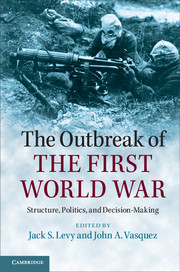Book contents
- Frontmatter
- Dedication
- Contents
- List of figures
- List of tables
- List of contributors
- Preface
- Part I Overview of debates about the causes of the First World War
- Part II Structure and agency
- Part III The question of preventive war
- 5 Restraints on preventive war before 1914
- 6 The sources of preventive logic in German decision-making in 1914
- 7 International relations theory and the three great puzzles of the First World War
- 8 Was the First World War a preventive war?
- Part IV The role of the other powers
- References
- Index
- References
7 - International relations theory and the three great puzzles of the First World War
Published online by Cambridge University Press: 05 July 2014
- Frontmatter
- Dedication
- Contents
- List of figures
- List of tables
- List of contributors
- Preface
- Part I Overview of debates about the causes of the First World War
- Part II Structure and agency
- Part III The question of preventive war
- 5 Restraints on preventive war before 1914
- 6 The sources of preventive logic in German decision-making in 1914
- 7 International relations theory and the three great puzzles of the First World War
- 8 Was the First World War a preventive war?
- Part IV The role of the other powers
- References
- Index
- References
Summary
The First World War continues to this day to be a source of great controversy among theorists of international relations (IR). Aside from its decisive role in shaping the twentieth century, there is probably one main reason why this particular war, above all others, seems to provoke such heated debate in the IR field: pretty well every major theory of international relations has a dog in this fight. Defensive realists and bargaining theorists, who believe wars occur because of spirals of mistrust and an inability to locate a mutually preferred negotiated peace, consider the First World War to be the preeminent case of actors falling into a war they would otherwise have wanted to avoid. Liberals and constructivists, who see wars arising from unit-level pathologies in the heads of leaders and their societies, can look to 1914 as a case where hypernationalism, class warfare, cartel politics, and psychological distortions led actors to race to the front in the hope of satisfying unmet domestic and personal needs. Structural neorealists, who argue that multipolar systems force great powers to support critical allies in a crisis, even at the risk of total war, view the First World War as their main example of such chain-gaining dynamics.
This chapter challenges each of these broad approaches to explaining the First World War. Consistent with dynamic versions of systemic realism founded upon the logic of preventive war, I argue that the war that broke out in that fateful summer of 1914 had one, and only one, primary cause: the profound fear among German leaders that their nation was in irreversible decline relative to a rising Russian colossus. For the key decision-makers in Berlin, all other apparent “causes” were either not important or only secondary to this preventive logic. Elsewhere, I have laid out a new approach to thinking about preventive war, one that differentiates between the effects of decline across bipolar and multipolar systems, and between decline that is inevitable versus temporary and reversible.
- Type
- Chapter
- Information
- The Outbreak of the First World WarStructure, Politics, and Decision-Making, pp. 167 - 198Publisher: Cambridge University PressPrint publication year: 2014
References
- 6
- Cited by



